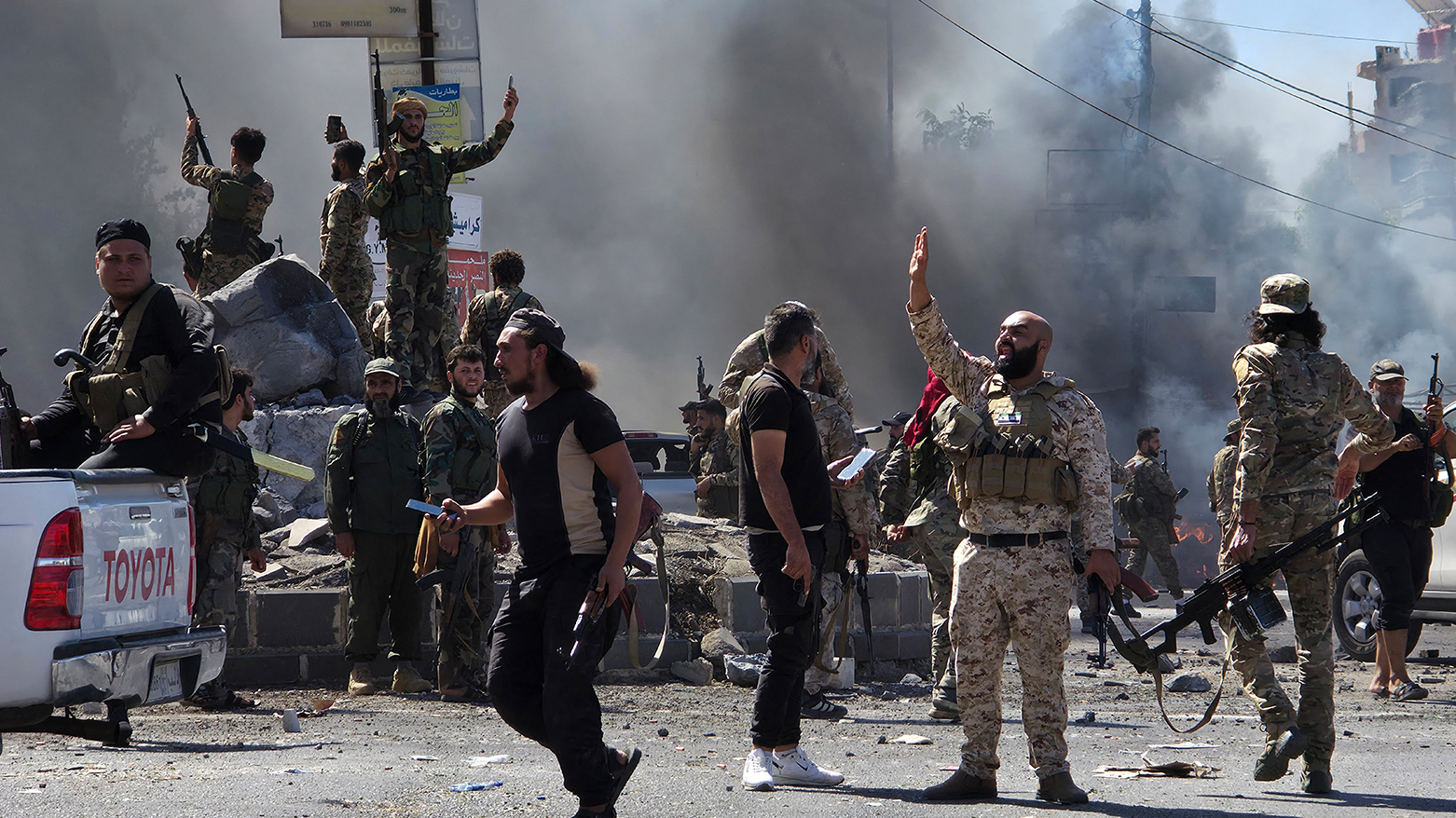Field Executions of 12 Druze Civilians in Sweida Spark Outrage Amid Escalating Tensions
Sweida spirals into violence as Syrian forces execute 12 Druze civilians, triggering mass protests and Israeli strikes. With 116+ dead in sectarian clashes, the crisis exposes Syria's fragile post-Assad fractures and growing international intervention.

By Ahora Qadi
ERBIL (Kurdistan24) – Military forces carried out field executions of 12 Druze civilians on Tuesday after storming a family guest house in the southern city of Sweida, according to the Syrian Observatory for Human Rights (SOHR), in what has been described as a serious escalation in the province.
Massacre Inside Al-Radwan Guest House
In a statement, SOHR said, “Members of the defense and interior ministries carried out field executions of 12 citizens after storming the Radwan family guest house in the city of Sweida.”
Unverified video footage circulating on social media shows bloodied civilians lying motionless inside the guest house, with pictures of Druze religious figures scattered on the floor and furniture visibly damaged.
According to SOHR, at least 15 other civilians were wounded during the raid, many in critical condition. The attack comes amid an ongoing surge in military operations in Sweida, with government troops accused of committing gross human rights violations.
Field Executions of 12 Druze Civilians in Sweida Spark Outrage Amid Escalating Tensions
— Kurdistan 24 English (@K24English) July 15, 2025
Sweida spirals into violence as Syrian forces execute 12 Druze civilians, triggering mass protests and Israeli strikes. With 116+ dead in sectarian clashes, the crisis exposes Syria's fragile… pic.twitter.com/33N94jsyr2
Abductions and Executions Amid Growing Security Crackdown
In the western countryside of Sweida, Syrian security forces also reportedly abducted several men and women from the village of Jarin. Their fate remains unknown, sparking fears that they too may face summary executions.
The attack on the guest house and the abductions have drawn widespread condemnation from local communities, as residents struggle to evacuate the injured due to ongoing threats in the area.
Tactical Withdrawal of Government Forces
Following the outcry, heavy weaponry and tanks previously deployed in Sweida city were withdrawn, while the General Security Forces took over security duties in the main streets. This move came after two days of fierce clashes and the announcement of a ceasefire by the Syrian transitional defense minister, Murhaf Abu Qasra.
According to field sources, the withdrawal appears to be an attempt to de-escalate tensions after the government's use of heavy arms in densely populated areas drew sharp criticism.
A partial curfew was reportedly imposed during the night in key areas, though no official decree has been released.
Israeli Strikes on Syrian Forces Deployed in Sweida
On the same day as the deadly raid, Israel launched targeted strikes against Syrian regime forces and military vehicles deployed in Sweida, asserting that the move was to protect the Druze minority. The Israeli military said the strikes aimed to “ensure the demilitarization of the area adjacent to our border with Syria.”
A joint statement by Prime Minister Benjamin Netanyahu and Defense Minister Israel Katz noted, “We are acting to prevent the Syrian regime from harming them.”
The Syrian defense ministry had earlier declared a “complete ceasefire” in Sweida following an agreement with local dignitaries.
Mounting Civilian Toll and Historical Tensions
According to SOHR, at least 116 individuals have been killed since the latest round of fighting erupted — including 64 Druze (four of them civilians) and 52 Syrian soldiers and Bedouin fighters. Government forces had previously claimed 18 casualties in their ranks.
The violence is the latest manifestation of longstanding tensions between Druze and Bedouin factions in Sweida, rooted in tribal and sectarian grievances. The current unrest was sparked after Bedouin gunmen abducted a Druze vegetable vendor on the Damascus highway, triggering retaliatory abductions.
SOHR reports that Bedouin tribes, predominantly Sunni, have at times sided with government forces against Druze factions.
Druze Resistance and Israeli Involvement
As clashes intensified, influential Druze spiritual leader Sheikh Hikmat al-Hijri reversed his earlier stance and issued a call for armed resistance: “Resist this brutal campaign by all available means.”
Israel, which hosts a Druze population of its own, has increasingly positioned itself as a protector of the group since the ousting of Bashar al-Assad in December.
While some Druze leaders welcomed Damascus’s deployment, others criticized it as a pretext for state repression.
Background to the Conflict
The conflict in Sweida has unfolded in a deeply fractured post-Assad Syria, where power vacuums and tribal tensions continue to undermine fragile ceasefire agreements. The Druze, estimated at 700,000 pre-war, are concentrated in Sweida and have maintained relative autonomy in the province. However, ongoing hostilities and violent state interventions now threaten to upend the province's delicate balance.
In an interview with AFP, Amal, a 46-year-old local woman, warned, “We fear a repeat of the coastal scenario,” referencing the March massacres of over 1,700 civilians in northwest Syria.
“We are not against the state,” she added, “but we are against surrendering our weapons without a state that treats everyone the same.”
As the city of Sweida grapples with the fallout from these deadly events, calls for accountability and an end to arbitrary violence grow louder. Yet, with ongoing military deployments and unresolved grievances, the path to stability remains elusive.